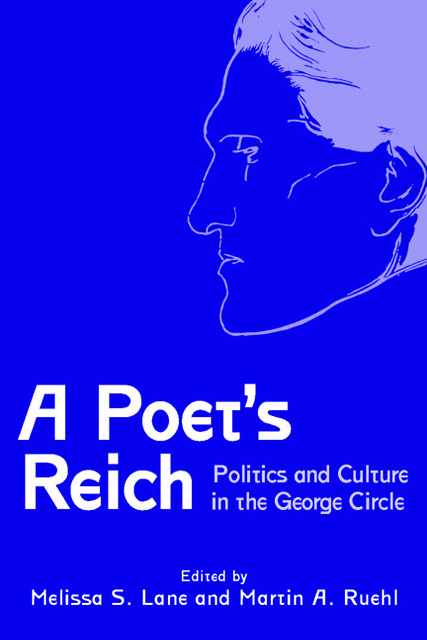Introduction
Published online by Cambridge University Press: 10 February 2023
Summary
Stefan George (1868–1933) was one of the most important figures in modern German culture. His poetry, in its originality and impact, was ranked by many contemporaries with that of Goethe and Hölderlin. The two collections of his early verse, Das Jahr der Seele (1897) and Der Teppich des Lebens (1899), still stand as landmarks in the history of early modernism, alongside his celebrated translations of Dante and Baudelaire. George’s significance, however, transcended the sphere of literature. At the beginning of the twentieth century, he gathered around himself a coterie of predominantly younger men, later known as the George Kreis, who subscribed to his vision of “das schöne Leben” and his comprehensive program of cultural renewal. George and his followers considered themselves the embodiment of “das geheime Deutschland,” a kind of counter-cultural nucleus or avant-garde that stood in radical opposition to the “official” culture of Wilhelmine and Weimar Germany. Some of his disciples were poets themselves; most of them occupied academic positions, notably in the fields of history, German literature, and classics. Their works, in particular their hero-worshipping biographies of great political or cultural figures, affected Germany’s educated middle class no less than George’s precious-prophetic verse. Above and beyond these publications, the George Circle exerted a peculiar fascination on a new generation of Bildungsbürger because of its almost sectarian exclusivity, its männerbündisch-homoerotic ethos, and its quasi-religious rituals.
Especially after the publication of his penultimate collection of poems, Der Stern des Bundes, on the eve of the Great War, George acquired a kind of cult following that extended well beyond the small group of acolytes — never more than twenty — who made up the core of the Circle. In 1916, after only a brief introductory meeting with him, the political economist Kurt Singer waxed lyrical about George in a letter to the philosopher Martin Buber, remarking that his life had become ever more imbued with the conviction “dass heute kein Mensch reiner und schöpferischer das Göttliche verkörpert als George — doch das ist nicht genug: dass der Knoten der Zeit und der Erneuerung sich in George schürzt […] Es ist, als ob alle grossen geistigen Ströme sich in diesem Menschen kreuzten und sich zur Kugel ballten.
- Type
- Chapter
- Information
- A Poet's ReichPolitics and Culture in the George Circle, pp. 1 - 22Publisher: Boydell & BrewerPrint publication year: 2011
- 1
- Cited by

